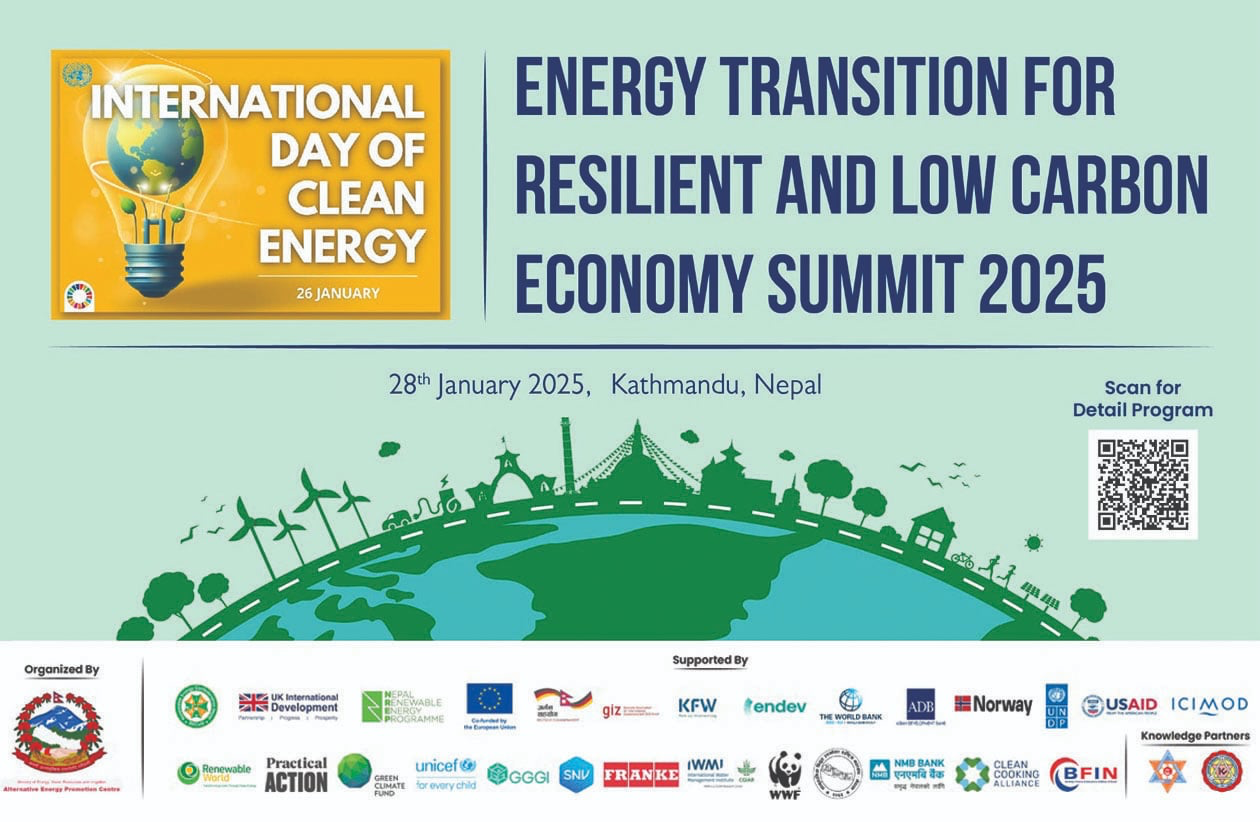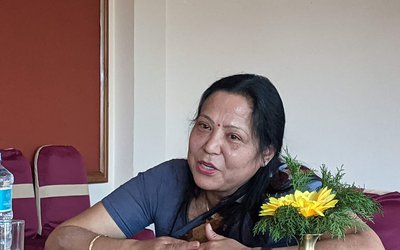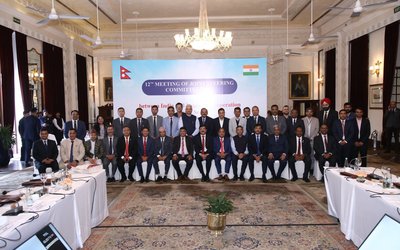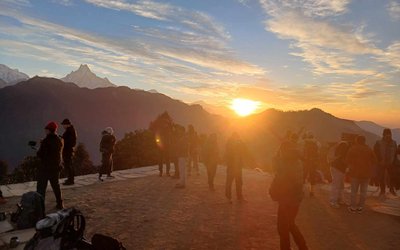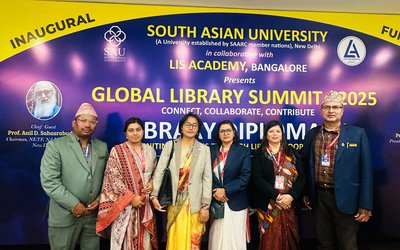
Completing many projects in rural parts of Nepal under earthquake recovery projects in remote parts of Nepal, Karuna Foundation, a local NGO, has shown a way to address the poor and marginalized population of Nepal. Deepak Raj Sapkota, Executive Director of Karuna Foundation Nepal, an NGO working in the field of Prevention of Childhood Disability (primary and secondary), Community Based Rehabilitation by strengthening local systems which ensures ownership, sustainability and efficiency, spoke to NEW SPOTLIGHT on the topic. Excerpts:
Recently the government has issued an integrity policy directing the NGOs and INGOs, how do you look at this?
The integrity policy needs to be looked at along with the amendment of Social Welfare Council Act and Organizations Registration Act. As an NGO worker, my opinion is that these three issues are interlinked and one cannot look at it in isolation.
Do you think the integrity policy is essential?
Nepal has several acts, regarding monitoring, to regulate the NGOs and INGOs. The current two acts are adequate to take action against NGOs and INGOs, which work against the interest of Nepal. Given such a situation, I don’t see any justification for the integrity act.
Without implementing the existing acts, there is no meaning to add another regulation. As the government and bureaucracy have never taken any responsibility and intuitive to implement them, they have been announcing new regulation and guidance to create uncertainty and chaos. This kind of haphazard implementation of laws and regulations is unlikely to bring any positive change. We have to take this seriously.
Why are NGOs targeted then?
It is difficult to comprehend. We are also the citizens of this country and we have also the responsibility and obligation towards the country and people as politicians and bureaucrats. We also love this country as much as politicians and bureaucrats.
What do you suggest?
If there are any problems, there is the need to have a review meeting with all the stakeholders to find out the solutions. If the government had announced integrity policy with proper discussion and interactions, one would not have to pass through the current phase of uncertainty. I compare the present policy with directives issued by Ministry of Finance and Nepal Rashtra Bank just few weeks after the earthquake regarding the relief operations.
Is this the first time this kind of thing is happening?
When earthquakes hit the country and large numbers of people lost their shelters and property, falling in a desperate need for help, the policy of finance ministry and Nepal Rashtra Bank added several hurdles, creating obstruction to NGOs and INGOs to receive the support and donations provided by Nepal’s well wishers and friends all over the world. Due to these two policies, needy people were compelled to live in the open sky without food and shelter and many willing well wishers of Nepal were unable to come to support the people. The conditions imposed to open bank accounts and to channelize the donor contribution diverted a huge amount of money to other areas. The losers were the poor and vulnerable people. Due to this policy, money concentrated on a few reputed institutions, and a number of small NGOs and INGOs, which had direct access to community, did not get anything.
What is the way out?
We need to think seriously as whether we want to find solutions or create confusions. I am now working in an NGO and I may change my profession tomorrow. What I want to say is I love this country no less than politicians and bureaucrats do. It is wrong to assume that all the persons working in NGOs commit wrong. There is a mentality in bureaucrats that the government needs to take action to punish them.
What do you suggest for NGOs and INGOs?
So far as the persons working in NGOs and INGOs are concerned, they also need to be prepared for performance evaluation and publish it to the benefit of the public. There are frequent debates over the role of NGOs. The time has come for all NGOs and INGOs to explain their role and contribution to the people about the comment on NGOs. Of course, there is certain weakness on the part of NGOs as well. I think that the number of project based NGOs are getting higher than those for missions and commitments. There is a trend among NGOs to follow projects. For this reason, NGOs also need to work responsibly and with mission.
Why are NGOs important?
There is the need of resources to launch the mission-based projects. Thus, the government also needs to facilitate in arranging the resources for NGOs. Government also provides resources to NGOs. If the government cannot arrange the resources, they should allow NGOs to work in those areas. There is also a blame that NGOs and INGOs are misusing dollar. This is a wrong notion. If the government starts distribution of money to NGOs, no one wants to seek fund from a foreign country. The government also seeks money from outside and we too go outside.
Are NGOs competitors?
NGOs are not a competitor of the government. We just complement to the government. As the government commits to fulfill aspirations of the people and work to address their grievances, NGOs and INGOs have also been contributing towards this, supporting the government in a complementary fashion. There is the need to have a broader collaboration and cooperation between them. With limited resources, the government cannot carry out the programs alone. We are working to strengthen the people and government.
What do you suggest as a solution?
If there is a problem, what is required is to address it jointly. If some apples are infected with disease, it is better to remove the apples rather than uproot the entire tree. The current effort of the government is to uproot the whole tree. This is not going to benefit anybody. The government has every right to review the policy on NGOs. If the government finds our presence unnecessary, they don’t need to keep NGOs for us. We will also choose another profession in case the government restricts NGOs.
Who do you blame for the current situation?
The current mentality of the bureaucrats and politicians that they are the only responsible persons and all others are irresponsible is suicidal for the long term-- don’t damage the institutions, which were created following decades of efforts.
Although organizations like Karuna Foundation Nepal have been working in close collaboration with the locally elected units, why is there a negative perception about NGOs and INGOs?
This is a mentality of bureaucracy, which always looks at NGOs as a competitor. Of course, NGOs are effective and efficient to implement small projects in far remote areas, directing resources to poor and vulnerable communities. One of the reasons behind this is that we work with local elected bodies and local communities. For instance, Karuna has been implementing its programs, collaborating with the local community and local level elected representatives. We select the projects for funding as proposed by the local levels. We never work to create our own institution. We all work with the local levels and institutions created by them. This is a mandatory legal requirement as well. Our programs are visible and transparent with complete accountability. We launch the program, sharing resources with local levels. Local levels and community contribute almost 60 percent of the resources in most of the programs. So far Karuna Foundation has launched a number of projects after the earthquake directed at vulnerable and poor communities of Nepal.
As you said NGOs like Karuna Foundation have been working in close collaboration with local community and local government effectively, why do you not bring this to the public?
How can I myself eulogize my work and success? It is unethical. Everyone can see the work done by Karuna Foundation Nepal in remote and rural Nepal. Even those who are in the government know our role and contribution. Even the government has openly commended our role in the earthquake and disaster. We are the first line of workers to reach any natural disaster. We have not done this to receive recognition and praise. We implemented the projects because we have resources to support the needy community.
Why are there the comments and criticisms about the NGOs and INGOs?
We have been working together with elected representatives and government officials. When we sit across the table personally, they praise us. However, when they are in the group, they see NGOs and INGOs are soft targets to blame for all the failure. Politicians and bureaucrats blame their failure on NGOs. Even politicians use words of disability. Individually, we have very good relations. However, they criticize us in group.
Don’t you think there are certain weaknesses in NGOs and INGOs as well?
I am not saying that all NGOs and INGOs have been doing a perfect work. If there is some NGOs that commits wrong, existing laws permit the government to take necessary action against the wrongdoer.
As Karuna Foundation Nepal has received national and international recognition for its work, how do you see its treatment in Nepal?
Nepal doesn’t have any mechanism to evaluate the role and functions of NGOs. Everyone is treated equally. Had there been an effective evaluation mechanism, the government would not have put all the NGOs in the same basket. I am not saying that we are completely clean. However, NGOs and INGOs perform and act. Whether you see in disaster and raising issues, NGOs are in the forefront. We have performance based payment system. If someone works well, they are paid handsomely. Although NGOs employees are well paid, there is no social protection for employees as with the government. NGOs and INGOs employees do the visit and speak new ideas. Nepal does not have any tradition to respect the living people. People are respected only after death.
Negativism is growing in Nepal. Every one speaks negative things. Although NGOs implement the project with small amount with high results, officials do not recognize us. Development is a progressive change. NGOs and INGOs have made a lot of contribution. Even so, NGOs are made the scapegoats.
How do you see the role of media?
Frankly speaking, media are powerful and have been contributing a lot in social and political transformation in the country. So far as coverage regarding the NGOs and INGOs are concerned, media coverage is negative. Instead of harping on the negative views about NGOs, media also need to visit the place and cover the impacts and implications of the work completed by NGOs and INGOs. Media always compare us if something goes wrong.
What is Karuna Foundation doing now?
As an NGO working in the field of Prevention of Childhood Disability (primary and secondary), Community Based Rehabilitation by strengthening local systems which ensures ownership, sustainability and efficiency, Karuna Foundation Nepal has been working in the areas to prevent the disability and implementing the model Inspire2Care. However, we were little deviated from this following the earthquake. Since earthquakes badly damaged infrastructure and houses of people with disability, we implemented many projects directed at them. We have reconstructed health posts and other facilities and supported to construct the shelters for people with disability. However, Karuna Foundation Nepal is back to its area of specialty. We have been implementing this project in whole Ilam District. Now we want to replicate it in entire province. If we replicate it in a province, the government can replicate it in the entire country. Many other countries around the world are also replicating our model. We have been providing technical support. In future, our target is to remain a resource center.
What is the state of preventable childhood disability in Nepal?
Globally, it is said that fifty percent of disability could be prevented. Just using the Folic Acid tablet use on a day of pregnancy planning by couple and women use the tablet three months after conceiving, it will prevent the disability coming from spinal related disease. The cost of the tablet is so cheap and it is affordable as well. Since we have maternal child component, we can easily include this. Other reason is childhood disability, CP. This can prevent shortening the delivery period or taking delivery at health posts. If there is pregnancy complication, women must be taken to health posts. There is the need of a regular health checkup for pregnant women. There is a simple solution to prevent disability.
What is the state of disability?
According the National Population Survey, there is just over 1.48 percent of population registered for disability. However, the number of disability cases depends upon the definition. Nepal has defined disability in seven categories. However, in the new act, disability is classified in 10. According to WHO, globally 15 percent of population have disability. There is 1.48 vs 15 percent. The difference is huge.
Where is focus area?
Now, we are focusing on prevention of childhood disability and working for better quality life for children and adult with disability and their family. To achieve this, we are working to strengthen the local level government through our programs.
Do you have any plan to expand the model?
Yes. We are in the process of expansion. It will be a model in larger population and geography of Nepal in the near future. Since this is the right approach to prevent disability, there is no option other than to implement it.
What are the other sectors Karuna Foundation Nepal has been working in?
Inclusive Disaster Response (Relief, Rehabilitation and Reconstruction) is another area where Karuna is involved. In Post-Earthquake situation of 2015, Karuna reached more than 100.000 individuals, out of which 7.500 were Children and Adults with Disabilities with relief materials, temporary shelters and medical assistance. Holistic Development Approach is also being implemented in five villages in Rasuwa and one in Sunsari, including pilot housing for 18 Mushar Families.
Establishment of multi-specialty Children's Hospital in Kathmandu and its satellite units in all seven provinces of Nepal is another project, which I am involved with.
What is remarkable about the role Karuna Foundation has been playing?
Karuna Foundation Nepal works for prevention of avoidable disabilities among children and adults and improvement in quality of lives of persons with disabilities and their families by strengthening government health care system and empowering families and communities. Karuna is also active in disability inclusive disaster relief and rehabilitation after the earthquake of 25th April, 2015 in Nepal through holistic approach.
How do you see your programs?
Karuna Foundation's proven replicable model is Inspire2Care. As a progressive NGO, Karuna Foundation believes in building on going capacity of its team as well as external stakeholders.
Have you replicated this model in other regions?
A significant milestone has been achieved in Inspire2Care’s journey towards replication of the Inspire2Care model. The implementation of Inspire2Care Program has officially started in Barahachhetra Municipality of Sunsari with the signing of agreement by the Mayor, endorsing the annual plan for its first year in the municipality. The plan was prepared in active participation of stakeholders such as elected representatives, Health Facility In-charge, teachers, Female Community Health Volunteers, Mothers’ Group, members of Disabled People’s Organizations and Child Clubs.
Is there any financial contribution of local level?
Barahachhetra Municipality has provided a substantial financial commitment of Rs. 2.6 million to the program for FY 2075/76 with the aim of creating Barahachetra Municipality as the first disability inclusive municipality of Federal Nepal, Province 1. This is the first time Inspire2Care Program is being implemented after restructuring of Nepal and the lessons learned from the implementation in Barahachhetra Municipality shall guide the process of replication to inspire more communities and to create impact on a bigger scale.
- VIST OF THE DUKE AND DUCHESS OF EDINBURGH TO NEPAL: Celebrating The Historical Ties Between The Two Nations
- Feb 11, 2025
- ADB’S SUPPORT: Protection Of Vulture
- Feb 11, 2025
- COMMEMORATION Of THE HOLOCAUST: Honoring The Victims
- Feb 11, 2025
- ECONOMY: Inflations At 5.41
- Feb 11, 2025
- NEPAL’S ENERGY SECTOR: Facing Crisis
- Jan 28, 2025
